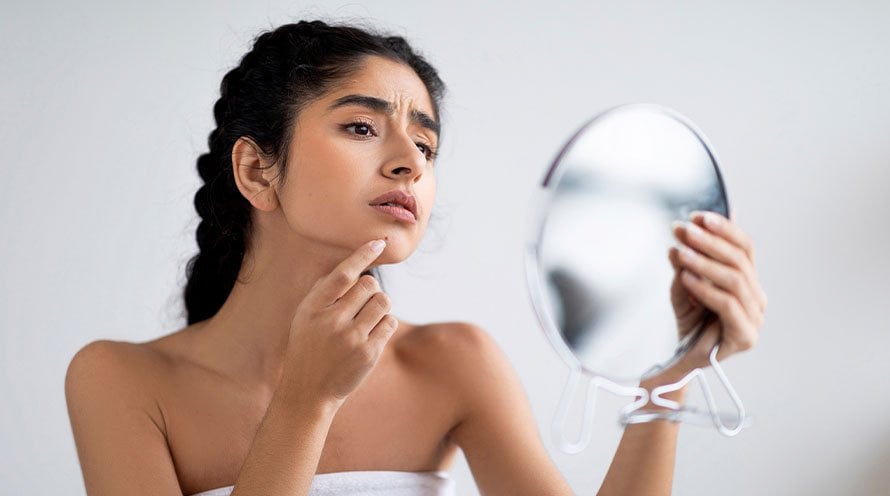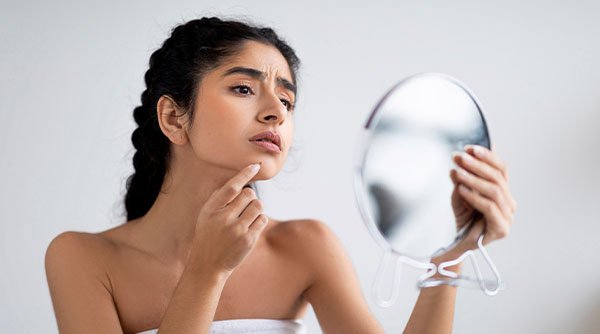Different Types of Acne & How To Prevent Them
Acne is a common skin condition that affects people of all ages, not just teenagers. While it may seem like a straightforward issue, the reality is that there are different types of acne, each with unique causes and treatments. Understanding the types of acne you are experiencing is crucial for effective management and long-term prevention.
How to Identify Your Acne Type?
• Whiteheads - Closed pores clogged with oil and dead skin, appearing as small white or flesh-toned bumps.
• Blackheads - Open pores filled with debris and oil that oxidise and turn black on the skin’s surface.
• Papules and Pustules - Red, inflamed acne spots—papules are solid, while pustules contain visible pus.
• Nodules - Large, painful lumps deep under the skin that are hard to touch and slow to heal.
• Cystic Acne - Severe, pus-filled breakouts beneath the skin caused by inflammation and hormonal imbalances.
Identifying Your Acne Type
Before diving into treatment options, it’s important to identify the specific form of acne on the face you might have. Here’s a quick guide to help differentiate between them:
• Whiteheads
Whiteheads are closed comedones that occur when dead skin cells and sebum clog pores, but the top of the pore closes up. This type of acne appears as small, white bumps and is typically non-inflammatory.
• Blackheads
Unlike whiteheads, blackheads are open comedones. The clogged pore remains open, and the surface darkens due to oxidation. Though still mild, blackheads are a visible and persistent form of acne on the face.
• Papules and Pustules
Papules are inflamed red bumps that do not contain pus, while pustules are similar but contain white or yellowish fluid. Both are considered inflammatory acne and may cause skin sensitivity.
• Nodules
Nodular acne is severe and occurs deep under the skin. These painful, hard lumps develop when bacteria, oil, and dead skin cells become deeply embedded.
• Cystic Acne
Cystic acne is the most severe form and can be extremely painful. It features pus-filled cysts that lie deep beneath the skin’s surface and often result in scarring if not treated properly.
Best Treatments for Each Acne Type
Knowing the different types of acne is only half the battle. The right treatment depends on your specific condition and skin type.
Best Treatments for Each Acne Type
• Treatment for Mild to Moderate Acne
Mild to moderate acne-like blackheads, whiteheads, and occasional pimples-can often be managed with a consistent skincare routine. For those experiencing mild to moderate acne, incorporating Garnier skincare products focused on cleaning and hydrating the skin can be beneficial. Consider starting with the micellar water to remove makeup, dirt, and oil without harsh rubbing, using products that include ingredients like salicylic acid, niacinamide, or benzoyl peroxide can help unclog pores, reduce inflammation, and prevent future breakouts.
• Treatment for Severe Acne
Severe acne-such as cystic acne or painful nodules—usually requires dermatologist-prescribed treatment. This may include antibiotics, or combination with medical-grade topical treatments.
• Home Remedies That Work
Tea tree oil can reduce inflammation in mild acne.
Green tea extract applied topically can calm skin and help fight bacteria.
Aloe vera is soothing and ideal for red, irritated acne on the face.
Keep in mind that not all home remedies are effective for severe acne. Consulting a professional is the best approach for stubborn or painful acne.
How to Prevent Acne Breakouts
Prevention is key for keeping acne at bay. Implementing a few simple strategies can reduce the risk of future breakouts.
• Skincare Routine for Acne-Prone Skin
Double Cleanse
Double cleansing involves using two types of cleansers—an oil-based cleanser. The oil-based cleanser helps remove sunscreen, makeup, and excess sebum, while the water-based cleanser eliminates dirt, sweat, and any remaining impurities. After the oil cleanse, choose a gentle face wash that helps maintain the skin’s pH balance, prevent irritation, and support the skin barrier-making it ideal for daily use, especially for those dealing with adult acne or sensitive skin.
Serum
If stubborn acne has left behind scars or dark spots, don't worry-you can still reclaim your glow. Add vitamin C face serum to your morning routine and vitamin C serum at night before bed. These antioxidant-rich formulas help fade pigmentation, prevent new marks, and restore your skin’s natural radiance.
Moisturize
To prevent triggering different types of acne, make sure to moisturize your skin thoroughly. Opt for alcohol-free, fragrance-free, and paraben-free vitamin C gel moisturizers to effectively support acne prevention and keep your skin balanced and hydrated.
Sunscreen
Apply serum sunscreen daily to protect your skin from UV damage and pigmentation caused by acne.
Pro tip: Avoid touching your face or picking at pimples, as this spreads bacteria and can cause scarring.
BB Cream
If you're dealing with frequent acne breakouts, it's best to cut back on heavy makeup like full-coverage foundation, thick concealers, or layered powders. These can clog pores and worsen acne. Instead, switch to a lightweight BB cream that works as a moisturizer, evens out your skin tone, and keeps excess oil in check—all without suffocating your skin.
• Foods & Habits That Trigger Acne
Certain lifestyle factors can trigger breakouts. Stress, lack of sleep, and hormonal imbalances also contribute. Smoking, alcohol consumption, and poor eating habits are some of the key causes of adult acne. To keep breakouts at bay, it's essential to eliminate acne-causing foods from your diet, such as processed sugar, fast food, and alcohol. Moreover, quitting smoking and limiting alcohol intake can significantly improve your skin's health and help you maintain clear, acne-free skin. One of the best tips to prevent acne is to maintain a healthy, balanced lifestyle and identify specific triggers unique to your body.
Tired of battling breakouts that just won’t quit? The good news is that understanding the types of acne and what triggers them is half the battle won. Whether you're dealing with blackheads, whiteheads, or deep cystic acne, adopting the right skincare routine and lifestyle habits can make all the difference.
Not sure where to begin? Take the Garnier Skin Care Quiz to get product recommendations tailored to your skin type and concerns. And don’t forget to explore Garnier’s skincare products and expert skincare tips to build a regimen that helps you say goodbye to acne—and hello to healthy, glowing skin.


